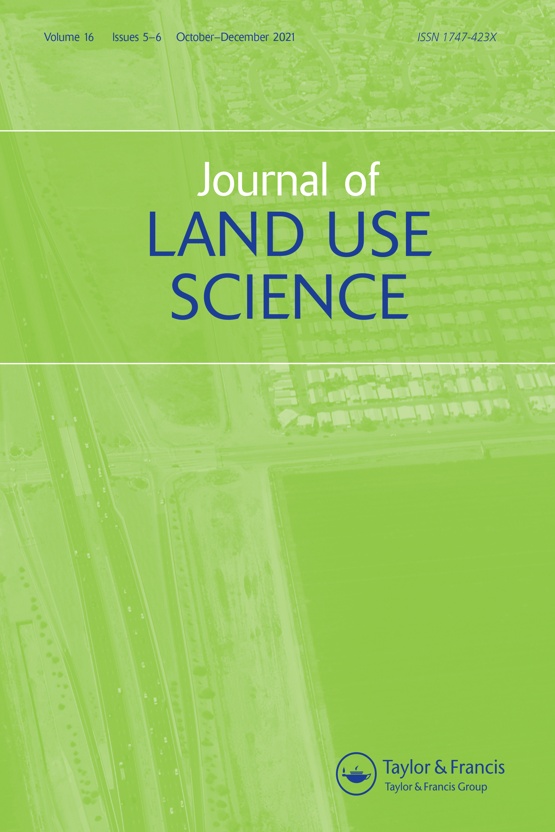Submit a Manuscript to the Journal
Journal of Land Use Science
For an Article Collection on
Responsible Land Systems for the Energy Transition: Analyzing, critically assessing, and improving land system and renewable energy interactions
Manuscript deadline
30 September 2024

Article collection guest advisor(s)
Assoc. Prof. Johannes Schmidt,
Institute of Sustainable Economic Development, University of Natural Resources and Life Sciences, Vienna
[email protected]
Dr. Michael Klingler,
Institute of Sustainable Economic Development, University of Natural Resources and Life Sciences, Vienna
[email protected]
Responsible Land Systems for the Energy Transition: Analyzing, critically assessing, and improving land system and renewable energy interactions
A new class of land systems is emerging globally due to the increasing expansion of renewable energies. In particular, low-carbon technologies such as solar PV and wind power are rapidly growing, e.g. the IEA's 2050 net-zero scenario projects that solar PV generation will increase by more than 20 times compared to today to achieve deep decarbonization of energy systems. However, these technologies also transform economic, social and ecological systems relying on land: multiscalar effects range from local impacts on rural livelihoods and ecosystems, to changes in land-use, land-management, and valuation of land, to transnational land deals linked to global energy commodity networks.
To reduce negative impacts and create positive co-benefits of the renewable energy transition, first, a deeper understanding of the past and current transformations of land systems is necessary. Second, improving future management and decision-making related to the spatial deployment of renewables will require exploring a variety of scenarios for the renewable energy transition - evaluating them according to a wide range of indicators and applying contrasting concepts of sustainability and justice, but also critically assessing the implications of these approaches across the Global North and Global South.
We aim to build a multi-, inter-, and transdisciplinary topical collection of original articles and review papers from energy geography, economics, energy systems research, and ecological impact assessments related to understanding and projecting the interactions between renewable energy and land systems. Topics include assessments of how renewable energies technology infrastructures, and in particular solar and wind energy:
- Interact with rural livelihoods,
- Interact with ecosystems, particularly encouraging discussions on impacts on biodiversity, carbon storage, or the local climate,
- Cause land cover and land-use change and associated spillover effects,
- Change agricultural activities and resource management,
- Redistribute costs and benefits for land users, and
- Intensify land conflicts by green extractivism and land grabbing.
Furthermore, we welcome submissions, which explore how to improve spatial planning and deployment of future renewable capacities, by:
- Critically assessing methods and frameworks
- Proposing coherent frameworks for valuation of costs and benefits,
- Proposing participatory approaches,
- Comprehensively addressing a wide range of indicators relevant to the interaction of human livelihoods and non-human ecosystems,
- Contrasting a variety of justice and sustainability concepts in such assessments, and
- Proposing systemic alternatives to the current expansion model.
Johannes Schmidt is an Associate Professor specializing in Energy & Resource Economics at the Institute for Sustainable Economic Development, located at the prestigious University of Natural Resources and Life Sciences in Vienna (BOKU). His research is primarily focused on the integrated modeling of energy systems with a particular emphasis on systems with high levels of renewable energies. Schmidt collaborates with a diverse group of researchers hailing from various disciplines including economics, climate science, human geography, and ecology, to better understand the complex challenges associated with the renewable energy transition. He has conducted extensive research in Brazil, the Netherlands, and Sweden, and has been awarded research grants from both national and international funding programs, including an ERC Starting Grant.
Michael Klingler is a human geographer and post-doc researcher at the Institute for Sustainable Economic Development at the University of Natural Resources and Life Sciences Vienna, Austria. His current research focuses on (i) energy geographies; (ii) environmental governance and green extractivism; (iii) co-production of knowledge and stakeholder engagement. His main research areas are Europe (esp. Austria) and Latin America (esp. Brazil).
All manuscripts submitted to this Article Collection will undergo a full peer-review; the Guest Advisor for this collection will not be handling the manuscripts (unless they are an Editorial Board member). Please review the journal scope and author submission instructions prior to submitting a manuscript.
The deadline for submitting manuscripts is September 30, 2024.
Benefits of publishing open access within Taylor & Francis
Global marketing and publicity, ensuring your research reaches the people you want it to.
Article Collections bring together the latest research on hot topics from influential researchers across the globe.
Rigorous peer review for every open access article.
Rapid online publication allowing you to share your work quickly.
Looking to Publish your Research?
Find out how to publish your research open access with Taylor & Francis Group.
Choose open accessSubmission Instructions
All manuscripts submitted to this Article Collection will undergo desk assessment and peer-review as part of our standard editorial process. Guest Advisors for this collection will not be involved in peer-reviewing manuscripts unless they are an existing member of the Editorial Board. Please review the journal Aims and Scope and author submission instructions prior to submitting a manuscript.